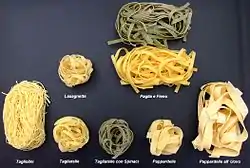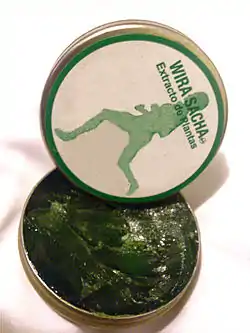パスタ
Japanese
Usage notes
The borrowed term パスタ (pasuta) only refers to foods derived from western-style pasta. This does not include traditional Asian foods like うどん (udon), そば (soba), ラーメン (rāmen), or ワンタン (wantan).
See also
See also
Kinds of pasta:
- マカロニ (makaroni): macaroni
- ラビオリ (rabiori): ravioli
- カネローニ (kanerōni): canneloni
- トルティーニ (torutīni): tortellini
- バーミセリ (bāmiseri): vermicelli
- スパゲッティ (supagetti): spaghetti
General terms:
Etymology 2
Borrowed from German Pasta,[2][1][3][4][5][6] or more likely from the homophonous and more common spelling Paste (“salve, paste”).
Noun
パスタ • (pasuta)
Usage notes
This term is seldom used for its medicinal meaning, and more commonly refers to the food. However, the medicinal sense may have more currency in medical contexts.
Synonyms
- 軟膏 (nankō), 軟膏剤 (nankōzai) (used more commonly to refer to medicinal ointment in general)
- 泥膏 (deikō)
- ペースト (pēsuto)
References
- 1998, NHK日本語発音アクセント辞典 (NHK Japanese Pronunciation Accent Dictionary) (in Japanese), Tōkyō: NHK, →ISBN
- 2006, 大辞林 (Daijirin), Third Edition (in Japanese), Tōkyō: Sanseidō, →ISBN
- 1997, 新明解国語辞典 (Shin Meikai Kokugo Jiten), Fifth Edition (in Japanese), Tōkyō: Sanseidō, →ISBN
- 1988, 国語大辞典(新装版) (Kokugo Dai Jiten, Revised Edition) (in Japanese), Tōkyō: Shogakukan
- 1995, 大辞泉 (Daijisen) (in Japanese), Tōkyō: Shogakukan, →ISBN
- 1998, 広辞苑 (Kōjien), Fifth Edition (in Japanese), Tōkyō: Iwanami Shoten, →ISBN
This article is issued from Wiktionary. The text is licensed under Creative Commons - Attribution - Sharealike. Additional terms may apply for the media files.

